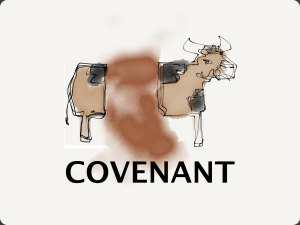 “Covenant” is one of those words that just keeps coming up when you read the Bible—and certainly when you study it. When we hear of “covenant” today, it sounds like lofty legalese for “contract,” or “agreement.”
“Covenant” is one of those words that just keeps coming up when you read the Bible—and certainly when you study it. When we hear of “covenant” today, it sounds like lofty legalese for “contract,” or “agreement.”
But covenant is a weighty theme that dominates Scripture: it’s good to get an idea of what it means in the Bible.
What is a covenant?
When the Bible mentions a covenant, it’s referring to a strong, solemn agreement between two parties. However, biblical covenants are very different from the kinds of agreements we make nowadays:
- Covenants make two into one. When two parties make a covenant in the Bible, they are joined together and identified with each other. They may exchange coats (1 Sa 18:3–4), have a commemorative meal (Ex 24:11), and erect a long-lasting memorial to their promise (Gn 31:46). At every covenant’s core, there is a change in relationship.
- Covenants involve promises. People don’t just join together at random: the agreement usually includes some kind of practical application. Sometimes it means not harming one another (Gn 31:50). Sometimes it means protecting one another (1 Sa 20). Sometimes it means agreeing not to obliterate a weaker people group (Jos 9:15). In some cases, it can have everlasting consequences—we’ll get to those later.
- Covenants involve families and bloodlines. In the Bible, two parties may make a covenant that is intended to last for generations. The following generations are automatically included in the covenant, and they share in the duties and benefits. For example, David made a covenant with his friend Jonathan, but after Jonathan died, he still cared for Jonathan’s relative, Mephibosheth (2 Sa 9:7).
- Covenants are spiritually charged. When Jacob and Laban agree to keep the peace, they don’t just say, “I’ll do this, you’ll do that. OK?” They call God as witness (Gn 31:50). David and Jonathan call God as witness between them, too (1 Sa 20:17). Covenants are taken seriously, and for good reason: two people are joining together based on little more than their words. They trust a divine being to hold them accountable, which means . . .
- Covenants are not easily broken. The people making covenants often slaughter animals to demonstrate what should happen to the one who breaks the covenant. To break a covenant is a serious thing. Jonathan calls on God to kill him if he does not alert David of danger (1 Sa 20:13). When Saul breaks a covenant his forefathers swore to the Gibeonites, God punishes Israel with a three-year famine (2 Sa 21:1–2).
When the Bible speaks of covenant, it’s usually more than just an alliance, and certainly more than a transaction of goods and services: it’s a bond that God Himself holds people to.
2 main kinds of covenant in the Bible
There are two main kinds of covenants in the Bible:
- Covenants between man and man. These are the covenants we’ve looked at thus far. They tie families together, they make new families, and they define relationships between entire people groups. Examples: Abraham and Abimelech (Gn 21:22–34), Jacob and Laban (Gn 31), David and Jonathan (1 Sa 18:1–5; 20), and marriage (Gn 2:22–24; Mal 2:14).
- Covenants between God and man. These are the really important ones—the ones that shape the story of the Bible, so they’ll get future blog posts all to themselves. A few things make these covenants especially special:
- God is His own witness. When a man swears an oath, he swears by something higher than himself. God doesn’t have that option (Heb 6:13).
- Some of God’s covenants are completely unconditional: they’re not sustained by human performance. When God makes His covenant with Abraham in Genesis 15, He doesn’t require anything from Abraham. His covenant with David was unconditional as well (1 Chr 17).
Much of the Bible’s story is shaped around the covenants between God and man. In fact, the Old Testament and the New Testament are named this way because they detail two major covenants between God and His people.
Where to read about covenants
Want to learn more about covenants? I recommend starting with the Pentateuch, which describes God’s covenants with Abraham and the Jewish people.
Here’s a list of books of the Bible in which covenant plays an especially important role:
- Genesis
- Exodus
- Deuteronomy
- Joshua
- Ruth
- 1 & 2 Chronicles
- Isaiah
- Hosea
- Matthew
- Romans
- Galatians
- Hebrews




Love it! Love you, too. We’re all so proud of you.
(Of course, I’d have been very proud of you just knowing your heart was continuing in steadfastness toward the Lord.)